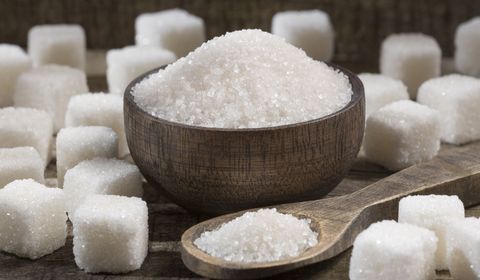“No sugar”, the sugar-free diet seduces TikTok
Published on
Updated
Reading 3 min.

To detox from sugar, a new trend is emerging on social networks: the “No sugar” diet. This challenge, which consists of completely eliminating (or at least reducing as much as possible) added sugar from your diet over a given period, is attracting more and more Internet users around the world. A phenomenon that is gaining ground, in particular thanks to its impacts on health.
Under the hashtags #NoSugarDetox, #NoSugarDiet, or even #30DaysNoSugar, Internet users share on TikTok their progress and their obvious results of a sugar-free diet: weight loss, reduction in cravings, improvement in the quality of the skin, and increase in energy.
The sugar-free diet doesn't mean eliminating sweet tastes from your diet, but rather removing added and refined sugar from processed foods. But what should you stop or replace to adopt this lifestyle?
If the body needs sugar, it is a question here of banning added sugars, that is to say those not coming from natural sources. Goodbye sodas, syrups, pastries, sweets, biscuits, ice creams… Goodbye also to certain ready meals, pizzas or cold cuts. Because sugar is hidden in a multitude of salty foods. According to a study by Anses, out of 54,000 processed foods sold in supermarkets, three quarters (77%) contain added sugar. On the other hand, fruits (as long as they are fresh and whole), vegetables, dairy products, starches, dark chocolate, or lean proteins are strongly recommended.
On social media, sugar-free meal prep videos, shopping lists, alternative dessert recipes, and testimonials are multiplying. The posts, often accompanied by spectacular before/after photos, are generating real excitement and motivating new followers to get started.
NO to diets, YES to WW!
Varied motivations
This phenomenon is rooted in a growing awareness of the harmful effects of sugar on health. But the reasons that push Internet users to adopt this diet are diverse.
The diet stems in particular from the “Glucose Revolution,” a method initiated by Jessie Inchauspé, a biochemist who studied glucose and its effects on the body. In her bestseller, the researcher demonstrates how a diet limited in sugar can improve overall health, skin quality, weight loss, emotions, sleep quality, and even have an anti-aging effect. Scientific studies also abound to denounce the links between excessive sugar consumption and various health problems.
For some, it is a quest for well-being and health, with the hope of losing weight or improving their physical condition. Obesity, diabetes and cardiovascular diseases are all health problems linked to the consumption of added sugar and its many derivatives such as xylitol. According to The European Heart Journal, these substances are harmful to health.
With the International Diabetes Federation predicting that 783 million adults will have diabetes by 2045, the sugar-free diet is seen as a solution to regulate glucose levels in the long term. Others are adopting the diet to regain control of their diet and combat sugar addiction, which has been described as a real addiction comparable to that of cocaine, according to Plos One.
While some people are content with a few days or weeks without sugar, others take a more moderate approach and simply reduce their sugar intake over the long term. Either way, this diet reflects a broader trend toward mindful, balanced eating.
